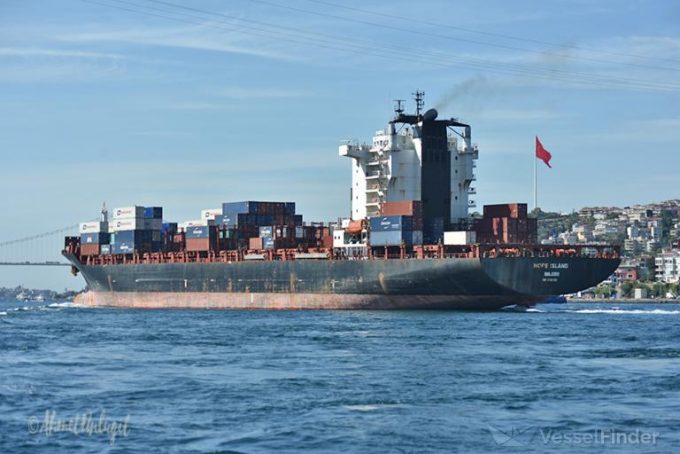WSC appoints Soren Toft and Randy Chen as new chair and vice chair
MSC boss Soren Toft and Randy Chen, vice chairman of Wan Hai, have become chair ...
FDX: ABOUT USPS PRIVATISATIONFDX: CCO VIEWFDX: LOWER GUIDANCE FDX: DISRUPTING AIR FREIGHTFDX: FOCUS ON KEY VERTICALFDX: LTL OUTLOOKGXO: NEW LOW LINE: NEW LOW FDX: INDUSTRIAL WOESFDX: HEALTH CHECKFDX: TRADING UPDATEWMT: GREEN WOESFDX: FREIGHT BREAK-UPFDX: WAITING FOR THE SPINHON: BREAK-UP ALLUREDSV: BREACHING SUPPORTVW: BOLT-ON DEALAMZN: TOP PICK
FDX: ABOUT USPS PRIVATISATIONFDX: CCO VIEWFDX: LOWER GUIDANCE FDX: DISRUPTING AIR FREIGHTFDX: FOCUS ON KEY VERTICALFDX: LTL OUTLOOKGXO: NEW LOW LINE: NEW LOW FDX: INDUSTRIAL WOESFDX: HEALTH CHECKFDX: TRADING UPDATEWMT: GREEN WOESFDX: FREIGHT BREAK-UPFDX: WAITING FOR THE SPINHON: BREAK-UP ALLUREDSV: BREACHING SUPPORTVW: BOLT-ON DEALAMZN: TOP PICK

The past week has seen an increase in attacks on shipping in the Red Sea, and a Houthi spokesperson has sparked fears of the ‘danger area’ expanding into the Arabian Sea.
Eight consecutive days of attack-free shipping in the Red Sea, between 23 March and 1 April, marked the longest quiet streak since December, when containerships began diverting around the Cape of Good Hope.
However, in the past week, UK Maritime Trade Operations (UKMTO) has confirmed two attacks on vessels, the most recent yesterday, 111km south-west of Al Hudaydah, Yemen.
UKMTO said: “The master of a vessel has reported two missiles in the vicinity. The first was intercepted by coalition forces, the second impacted the water a distance from the vessel. The vessel reports no damage, and the crew is reported safe. The vessel is proceeding to next port of call.”
Listen to this clip from the latest episode of The Loadstar Podcast where Xeneta’s Peter Sand discusses how Red Sea disruptions are affecting container shipping rates:
Meanwhile, Houthi spokesperson Yahya Saree said on TV yesterday that during the past 72 hours, Houthis had targeted a British ship and several US frigates in the Red Sea. He also said they had attacked two Israeli vessels in the Arabian Sea and Indian Ocean that were heading to Israeli ports.
The Times of Israel reported that, according to Mr Saree, the attacks included a missile strike against British ship Hope Island, and what Mr Saree described as “two Israeli ships”, MSC Grace and MSC Gina.
The 3,500 teu Hope Island (pictured above) is owned by UK firm Borealis Maritime, chartered to Italian operator Messina Line and deployed on the RSSEA service that connects the Italian ports of Genoa and Salerno with a string of east African ports, turning in Durban. According to AIS data, its next call is Mombasa on 16 April.
And, according to AIS data from vesselsvalue.com, the 900 teu MSC Grace is currently moored at Mombasa with armed guards on board.
The 4,000 teu MSC Gina has just been assigned to MSC’s Dar Es Salaam feeder service that has a port rotation of Mombasa-Dar Es Salaam-Colombo. If the vessel was the intended target, it ought to have been steaming on a course far outside what has so far been understood to be the Houthi danger area.
Lars Jensen, CEO of Vespucci Maritime, said: “The element to note is the claim to have attacked vessels in the Arabian Sea which is essentially the northern end of the Indian Ocean.
“If this is true, it would constitute an expansion of the risk area to the approach routes to the major container hubs on the south coast of Oman, as well as approach routes towards the Strait of Hormuz,” he added.
However, while the Houthis claimed to have carried out these attacks, they have not so far been corroborated by other sources.
Mr Jensen pointed out that this could have either be propaganda to make the Houthis appear more resourceful – the targeting was so poor that the vessels in question never even saw the attack – or that the attacks were indeed real and close, but for some reason the intended targets chose not to publicly report them.
He added: “Another option could be that the Houthis are simply claiming this without any factual basis, in the hope that the threat alone would cause more ships to start avoiding the area, and hence expand their de facto vessel blockade to a larger area.”
Comment on this article